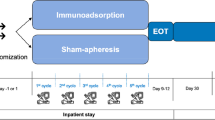Abstract
We have reported that about half of children with chronic non-specific complaints were positive for antinuclear antibodies (ANA) and that the commonest complaint was fatigue in ANA-positive patients. Therefore, we have proposed a novel disease entity of autoimmune fatigue syndrome (AIFS). In order to investigate the relationship between AIFS and chronic fatigue syndrome (CFS) in children, all CFS patients seen in our clinic were immunologically assessed. Immunological examinations including ANA, autoantibody analysis by Western immunoblotting, lymphocyte subsets and NK activities were performed on 14 CFS patients. Clinical courses of these patients were reviewed retrospectively. None of the patients had fulfilled the CDC criteria for CFS at their first visit. They fulfilled the criteria in a relatively short time, with a 6 months to 6 years smoldering period. All patients had been diagnosed as school refusal by physicians or school teachers. Thirteen patients were positive for ANA and the other one was positive for rheumatoid factor. Twelve patients were positive for antibodies to the 62 kDa protein (anti-Sa) which had been detected in about 40% of AIFS patients. NK activity was not as low as reported in adult patients with CFS. Most of the children with CFS were positive for ANA, suggesting an autoimmune mechanism may play an important role in the pathogenesis of childhood CFS. AIFS patients should be carefully followed because of the possibility of later development of CFS.
Similar content being viewed by others
References
Vereker MI, Chronic fatigue syndrome: a joint paediatric—psychiatric approach,Arch Dis Child 67, 550–555 (1992).
Bates DW, Buchwald D, Lee J, Kith Pet al., Clinical laboratory test findings in patients with chronic farigue syndrome,Arch Intern Med 155, 97–103 (1995).
Nishikai M, Kosaka S, Incidence of antinuclear antibodies in Japanese patients with chronic fatigue syndrome,Arthritis Rheum 40, 2095–2096 (1997).
Itoh Y, Hamada H, Imai Tet al., Antinuclear antibodies in children with chronic nonspecific complaints,Autoimmunity 25, 243–250 (1997).
Holmes GP, Kaplan JE, Gantz MMet al., Chronic fatigue syndrome: a working case definition,Ann Intern Med 108, 387–389 (1988).
Itoh Y, Rader MD, Reichlin M, Heterogeneity of the Ro/SSA antigen and autoanti-Ro/SSA response: evidence for 4 antigenically distinct forms,Clin Exp Immunol 81, 45–51 (1990).
Landay AL, Jessop C, Lennette ETet al., Chronic fatigue syndrome: clinical condition associated with immune activation,Lancet 338, 702–712 (1991).
Whiteside TL, Herberman RB, The role of natural killer cells in human disease,Clin Immunol Immunopathol 53, 1–23 (1989).
Itoh Y, Fukunaga Y, Hamada Het al., Familial chronic fatigue syndrome with positive antinuclear antibodies,J Jpn Pediatr Soc 101, 1517–1521 (1997).
Aoki T, Miyakoshi H, Usuda Yet al., Low NK syndrome and its relationship to chronic fatigue syndrome,Clin Immunol Immunopathol 69, 253–265 (1993).
Deane PMG, Liard G, Siegel DMet al., The outcome of children referred to a pediaric rheumatology clinic with a positive antinuclear antibody test but without an autoimmune disease,Pediatrics 95, 892–895 (1995).
Kandil O, Borysenko M, Decline of natural killer cell target binding and lytic activity in mice exposed to rotation stress,Health Psychol 6, 89–99 (1987).
Bonneau RH, Sheridan JF, Feng Net al., Stress-induced suppression of herpes simplex virus (HSV)-specific cytotoxic T-lymphocyte and natural killer cell activity and enahancement of acute pathogenesis following local HSV infection,Brain Behav Immunol 5, 170–192 (1991).
Buchwald D, Cheney PR, Peterson DLet al., A chronic illness characterized by fatigue, neurologic and immunologic disorders, and active human herpes virus type 6 infection,Ann Intern Med 116, 103–113 (1992).
Landay AL, Jessop C, Lennete ETet al., Chronic fatigue syndrome: clinical condition associated with immune activation,Lancet 338, 707–711 (1991).
Kitani T, Kuratsune H, Fuke Iet al., Possible correlation between Borna disease virus infection and Japanese patients with chronic fatigue syndrome,Microbiol Immunol 40, 459–462 (1996).
Lloyd A, Hickie I, Hickie Cet al., Cell-mediated immunity in patients with chronic fatigue syndrome, healthy control subjects and patients with major depression,Clin Exp Immunol 87, 76–79 (1992).
Ray C, Weir WRC, Cullen Set al., Illness perception and symptom components in chronic fatigue syndrome,J Psychosom Res 36, 243–256 (1992).
Blakely AA, Howard RC, Sosich RMet al., Psychiatric symptoms, personality and ways of coping in chronic fatigue syndrome,Psychol Med 21, 347–362 (1991).
Kuratsune H, Yamaguti K, Takahashi Met al., Acylcarnitine deficiency in chronic fatigue syndrome,Clin Infect Dis 18 (suppl. 1), S62–67 (1994).
Demitrack MA, Dale JK, Straus SEet al., Evidence for impaired activation of the hypothalamic-pituitary-adrenal axis in patients with chronic fatigue syndrome,J Clin Endocrinol Metab 73, 1224–1234 (1991).
Kitani T, Kuratsune H, Chronic fatigue syndrome,J Jpn Med Ass 81, 573–582 (1992).
Behan PO, Bakheit AMO, Clinical spectrum of postviral fatigue syndrome,Br Med Bull 47, 793–808 (1991).
Konstantinov K, von Mikecz A, Buchwald Det al., Autoantibodies to nuclear envelope antigens in chronic fatigue syndrome,J Clin Invest 98, 1888–1896 (1996).
Plioplys AV, Chronic fatigue syndrome should not be diagnosed in children,Pediatrics 100, 270–271 (1997).
Dowsett EG, Colby J, Long term sickness absence due to ME/CFS in UK schools: an epidemiological study with medical and educational implications,J Chronic Fatigue Syndrome 3, 29–42 (1997).
Dowsett EG, Colby J, Chronic fatigue syndrome in children —journal was wrong to criticise study in school children,Br Med J 315, 949 (1997).
Author information
Authors and Affiliations
About this article
Cite this article
Itoh, Y., Fukunaga, Y., Igarashi, T. et al. Autoimmunity in chronic fatigue syndrome in children. Japanese Journal of Rheumatology 8, 429–437 (1998). https://doi.org/10.1007/BF03041320
Received:
Accepted:
Issue Date:
DOI: https://doi.org/10.1007/BF03041320




